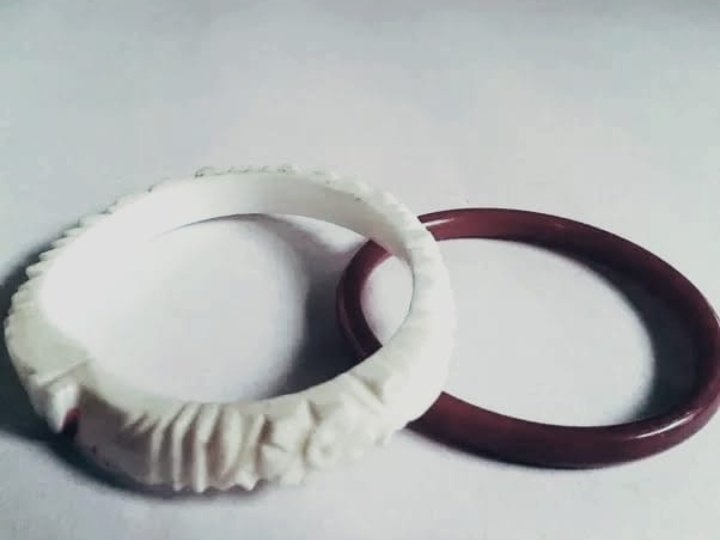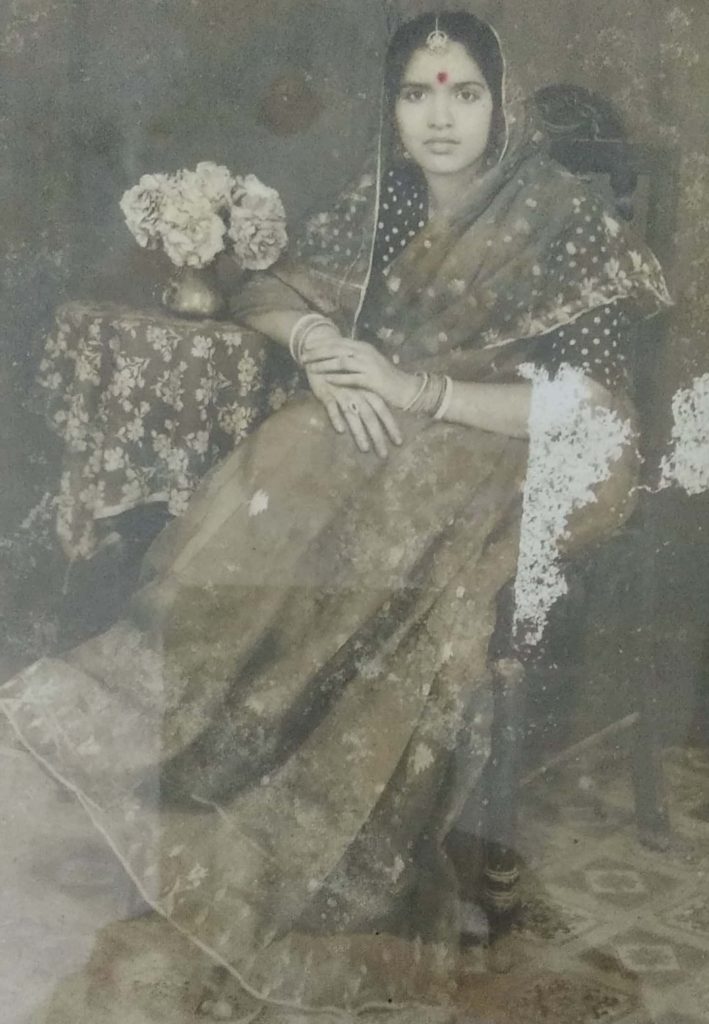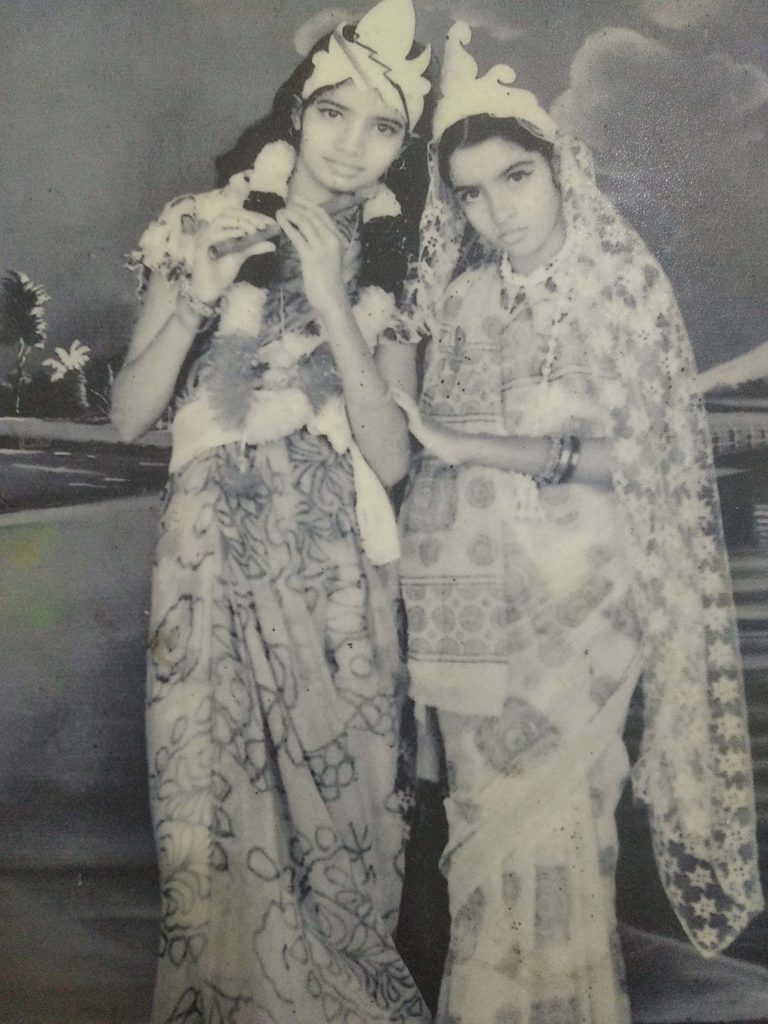Partition stories have been narrated over the years but have scarcely done justice to the unheard families who had to pack their lives into small bags and leave their motherlands. While we have gone a step further in addressing the North-West side of the Partition, there are many stories that emerged from the East as well, and this piece wraps into one another as it unfolds two such stories of more than two families and the following generations. The Liberation War is significant to South Asian history, where much like the Partition, the sense of victory was saddled with loss, pain, and reminisce.
Jinia Mukherjee:
Long before my Dadu, Narayan Kar married my Didan, Geeta Dutta, he was an apprentice with his father in making bangles from conch shells called Shakha. Meanwhile, he got married and after his fourth child in 1973, he established his own business with a shop, factory, and warehouse. Conch shells are said to be like banana trees, no part ever goes waste. They are collected, cleaned, and then later processed for making various things like bangles, rings, décor. Getting the final product involves several tedious processing which requires skilled labor and factory machinery. After establishing his own business, my Dadu supervised the sales along with his older son. For raw materials, he would often travel to Madras or have businessmen travel from there. Trade also moved back and forth from Assam, Agartala, and Bangladesh.

But how my Dadu came about to set his business in Kolkata, or even set his foot on the land is quite a story. He was around thirteen years old during the Partition of 1947. His house in Bangladesh was torched but his mother was already prepared like she knew it was coming for them. She had preserved some gold jewellery in a steel dabba and some biscuits in another. When the fire worsened and penetrated through every room, she could only reach out to one of the dabbas, and she only got hold of the one with biscuits. They went to a nearby police station and spent a night there. Next day they were sent to a refugee camp in North Chabbish Porgana and were given a house. His father was a craftsman and seven years later, their family shifted to Komartuli, Kolkata and he got married to my Didan.
His shop and factory were all set near the Ganga ghat where there were many temples. This helped the business grow because shankh was used in temple proceedings, as jewellery ornamented on idols, and attracted women who worked near the ghats. Even now, the street opposite the ghats is lined with several shops including my grandfather’s. After cancer took him for good, the business was passed on to his oldest and youngest sons who were already involved in the business.
Geeta Rani Dutta didn’t belong from Kolkata either, like several refugees she also accepted Kolkata as her home while her father Dr. Narendranath refused to leave Bangladesh. He was determined to live and die on the land where he was born. The communications between them slowly diminished.
It was the summer of 1947, communal tensions were only rising and several people migrated from East Pakistan to West Bengal and from Bengal to East Pakistan. Narendranath Dutta had five children and he transported them one after another to Kolkata. He felt compelled to do that because he was scared he wouldn’t be able to protect his family. He never left Dhaka as he had several patients to look after and he was also under protection because he was one of the best doctors around back then. After the partition of 1947, along with his practice he also started offering counsel to Bidhan Chandra Roy who took office as the Chief Minister of Bengal in 1948. My Didan never saw her father again, and he died almost half a decade before the Liberation War. It has been several years but she does not want to go back, although she still searches for reasons that compelled her father to stay and not leave with them.

***
Aparajita Dasgupta:
While some were rejoicing the liberation of Bangladesh in 1971, Sukla’s family like many others who had to leave everything behind weren’t too ecstatic about it. The long standing pursuit of freedom from Pakistan was not liberating for all, many of them lost more than just their rights that night in December.
Having grown up in a mixed crowd of Hindu and Muslim Bengalis, celebrating both Eid and Durga pooja together, Sukla, my mother didn’t understand that these two were ever different. She was too young to know any better. According to her Zarina’s mother’s iftar meals were just as delicious as Moumita’s mother’s luchi-aloo’r dum. She went to school with these girls, her hair in two braids and a napkin pinned to her uniform. She often wonders what became of them and where they are now, whether their kids are like hers or their husbands are in good health.
I’ve grown up hearing these stories of how maa’s family had to leave everything behind and how that changed their entire world overnight. My grandfather lost his paint business and that caused him so much trauma that he went mute and was nearly paralysed. He had two young daughters and two younger sons and a wife that panicked about everything. They watched as their neighbourhood was searched and checked for Hindus and Muslims, the difference reinforced with every soldier’s uniform. When time came for them to leave they grabbed whatever they possibly could and were pushed out of their home along with the other Hindu Bengalis in Bangladesh. They packed some clothes, whatever little gold Shobha Didu had saved from her wedding which was to be passed onto her daughters.
Their Muslim neighbours offered to provide them with shelter but the soldiers were ruthless with these families. They would demand money and jewellery at the borders and would treat women and children with utmost disrespect. They would raid the houses and take things that they wanted.
My Didu turned into a warrior that night, she had to keep her children safe and take care of her disabled husband. The soldiers demanded her gold earrings and without a second thought she removed it and gave it just so they would let them pass safely.

Looking back at her former life, the terror shadowing it all, she brought her family of five to Kolkata and stayed in her brother in law’s house in Kannagar. Having lost their ancestral home, business and life overnight, they slept on the floor and wondered what their life would become henceforth. They worried about their neighbours and school friends; the clothes that were left out to dry and each one cried that night out of fear of uncertainty but were happy to have each other. They held on to that hope and idea which offered momentary solace.


Life in Kannagar was hard with my Dadu in a jeopardized condition and the entire burden upon my grandmother, she worked multiple jobs just to make ends meet and send her kids to school. She had to marry off her daughter’s very early just so she could continue educating her son’s. Nivedita mashi was married to a Bangladeshi man named Deepak who was kind and offered to educate her further. My mother often jokes that he should have married her as well so they could all be a happy family back in their hometown and so she could touch the uneven walls of her house in Barishal, a familiar feeling along her fingertips that she still recalls despite never having been back. She now visits and tries to imagine her past life only through video calls with her sister.
The Open Dosa Team
Latest posts by The Open Dosa Team (see all)
- META 2026 - 10th February 2026
- Area Bois at SJU - 6th April 2023
- This is love, not reproach - 21st February 2023






Lorrie 31st October 2021
Thanks for sharing your thoughts about website. Regards
Gaston 25th November 2021
Simply wish to say your article is as astounding.
The clarity in your post is simply nice and i could assume you’re an expert on this subject.
Well with your permission allow me to grab
your feed to keep up to date with forthcoming post.
Thanks a million and please carry on the gratifying work.
Brodie 27th November 2021
I have read so many articles or reviews regarding the blogger lovers except
this piece of writing is genuinely a fastidious piece of writing, keep it up.
Glen 27th November 2021
If some one wants expert view regarding blogging then i propose him/her to visit
this website, Keep up the pleasant job.